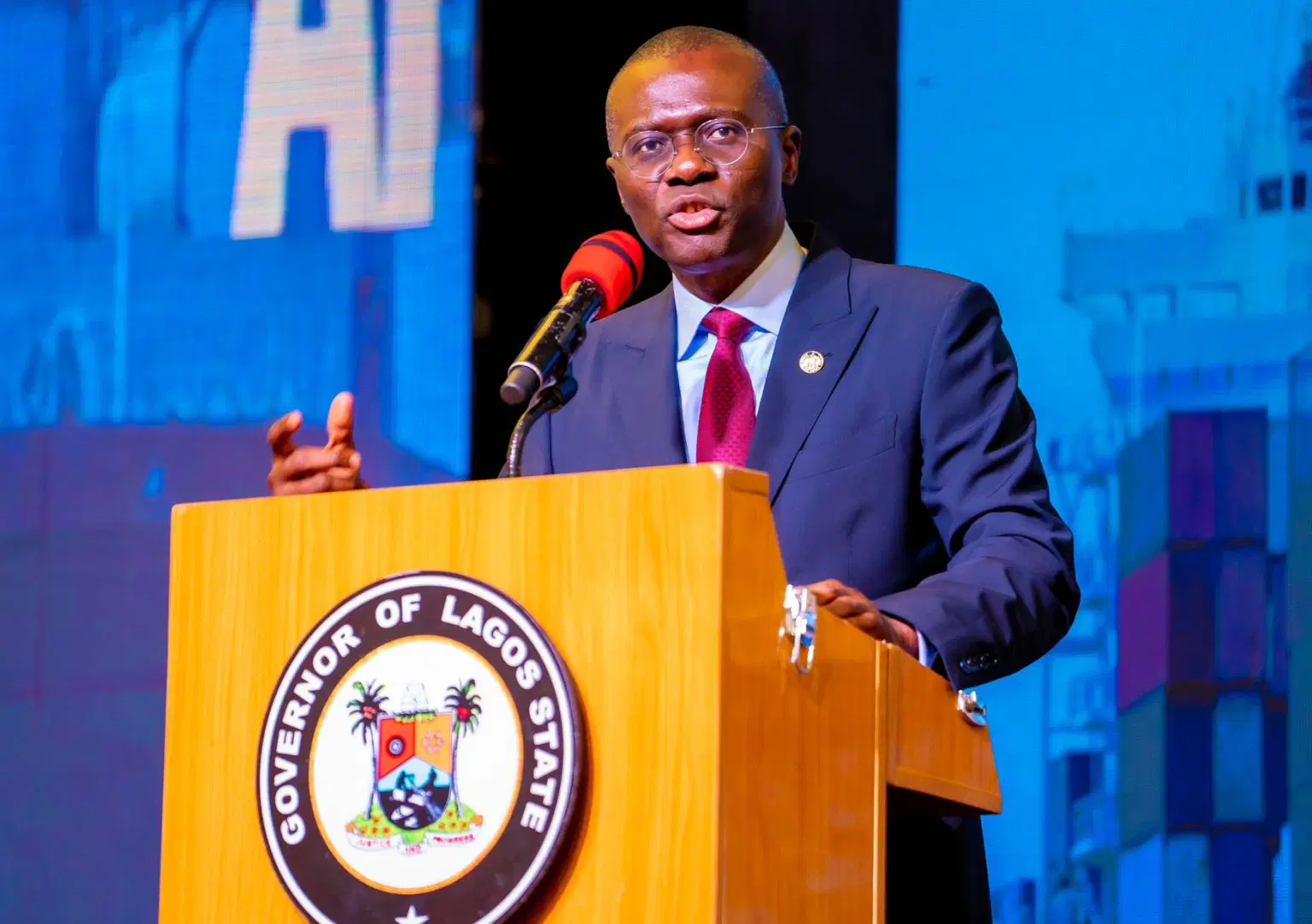Lagos State Governor Babajide Sanwo-Olu has disclosed that over N100 billion has been realised so far for the launch of a N500 billion Produce-for-Lagos Off-taker Guarantee Fund, aimed at boosting food production and supply, reducing imports, and enhancing agricultural productivity across Nigeria.
Out of the funds realised, Chairman of the United Bank for Africa, UBA, Tony Elumelu, announced the sum of N25 billion support for the programme.
Sanwo-Olu announced this in his address during the official launch of the initiative and signing of Memorandum of Understanding, MoU, with partnering states, on Wednesday, held at Lagos House, Alausa, Ikeja.

Sanwo-Olu, the host, along with five other governors, were also in attendance to launch the intervention fund for investment.
Also present were Ogun State Governor, Dapo Abiodun, Kogi State Governor, Ahmed Ododo, Niger State Governor, Umaru Bago, Taraba State Governor Agbu Kefas and Deputy Governor of Ondo State, Olajide Owolabi, while the Governor of Ekiti State was represented.
Others were Minister for Digital Economy, Bosun Tijani, Chief of Defence Staff, Gen. Christopher Musa, Chairman Heirs Holdings, Minister for Finance Wale Edun, Minister of State for Finance, Doris Aniete, Minister of Digital Economy, Bosun Tijani, as well as the Minister of Livestock, Idi Maiha.
Other personalities include Lagos State Deputy Governor, Dr. Obafemi Hamzat, Deputy Governor of Ondo State, Olajide Owolabi, Speaker of the Lagos State House of Assembly, Mudashiru Obasa,
Commissioner for Agriculture and Food Systems, Ms. Abisola Olusanya, the organiser, members of the State Executive Council, members of the Governor’s Advisory Council, GAC, All Progressives Congress, APC, captains of industry, traditional rulers, religious leaders, community leaders, market leaders and associations, civil society organisations, among others.
N16.14 trn Lagos food economy
In his address, Sanwo-Olu said Lagos is Nigeria’s largest food market, consuming over 50 per cent of the food traded in the Southwest, with a food economy then valued at N16.14 trillion.
He, however, said that Lagos loses nearly 50 per cent of its food between harvest and the market, largely due to poor storage and inefficient transportation.
“There is the need to transform Lagos’ food system to ensure that the state can feed itself sustainably, both now and in the future.
“‘Produce for Lagos Programme’ will boost agricultural production in the state and reduce reliance on informal and uncoordinated supply channels, create jobs for our youth and increase economic returns for all ecosystem stakeholders,” the governor stated.
The programme, Sanwo-Olu said, will be implemented through the Lagos Food Systems Infrastructure Company (LAFSINCO), and supported by key Special Purpose Vehicles like the Lagos Bulk Trading Company, Ekolog (Eko Logistics), and the Produce for Lagos Fund.
“This fund will also help to stabilise food prices and de-risk agricultural operations across the value chain,” the governor stated.
To transport the farm produce, Sanwo-Olu said a fleet of 150 cold and dry trucks will be deployed in partnership with the private sector.
Olusanya
According to Olusanya, the initiative is expected, among others, to reduce post-harvest losses in participating states by 40 per cent, create over four million jobs nationwide, cut national food imports by over 60 per cent, and drive an annual 25 per cent reduction in food prices and inflation.
“With the launch of the N500 billion Produce-for-Lagos off-taker Guarantee Fund and programme by Mr. Governor, I implore everyone to join us as we kickstart a bold vision to catalyze, empower, and scale food production, storage, logistics, marketing and distribution across the nation, creating jobs, boosting local economies, and securing our future food supply.”
The commissioner urged farmers, players and stakeholders across Nigeria’s agricultural value chain to unite in building a food sovereign system.
Lagos, with an estimated 25 million people, Nigeria’s most populous city, is projected to reach a population of about 34 million by 2030, which will push annual food demand to approximately N7.96 trillion.
According to reports, with the current production levels, the state would need to import food worth about N3.38 trillion annually by 2030 to meet demand.
To bridge the gap and achieve 40 per cent local production, Olusanya said, the state must increase food output.
“The food demand of the state will rise to N7.96 trillion per annum by 2030. At present, with the local food production output, the state will need to import food worth about N3.38 trillion per annum by 2030 to meet demand.
“To achieve 40 per cent local production, the state needs to grow its production by about 20 per cent per annum.
“We need to collaborate internally, externally for Lagos food security,” Olusanya stated.
UBA
According to Elumelu, “The programme will help to address the issue of unemployment in the state as more youth can be employed to be part of the initiative. UBA will be supporting the programme with the sum of N25 billion.
“Food security is very important. An hungry person is an angry person. This is an important initiative.
“We have lots of unemployment in the country and agriculture will help take people off the streets.
“This programme will help to fix the joblessness of young people. We will work together to make this initiative a reality. We in the private sector will support you,” he assured Sanwo-Olu.
In her contribution, Aniete hailed Lagos State government for the initiative, adding that it underscores the state’s commitment to food security and partnership with other states.
“It signals a level of seriousness and unlocks the potential of our farmers and producers. It’s in alignment with President Tinubu’s renewed hope agenda. It lowers logistics and transport costs of moving food from long distances. It’s a platform to build relationships between the south and the north and a call for stakeholders to join hands together to build a Lagos and Nigeria that feeds itself,” Aniete said.
Earlier, Tijani applauded the Lagos State government for the vision of the initiative, describing it as one of the most visionary food interventions.
“It gives farmers and food producers the most value for their food produce. By absorbing farm produce, the state government is setting the state up for growth. This is how we build a resilient city and rebuild our future,” Tijani said.
The five governors, while describing the programme as “ambitious and apt,” in their separate addresses, expressed readiness to partner with Lagos State in the areas of comparative advantages in boosting food security, not only in Lagos but Nigeria.
Stay ahead with the latest updates!
Join The Podium Media on WhatsApp for real-time news alerts, breaking stories, and exclusive content delivered straight to your phone. Don’t miss a headline — subscribe now!
Chat with Us on WhatsApp








